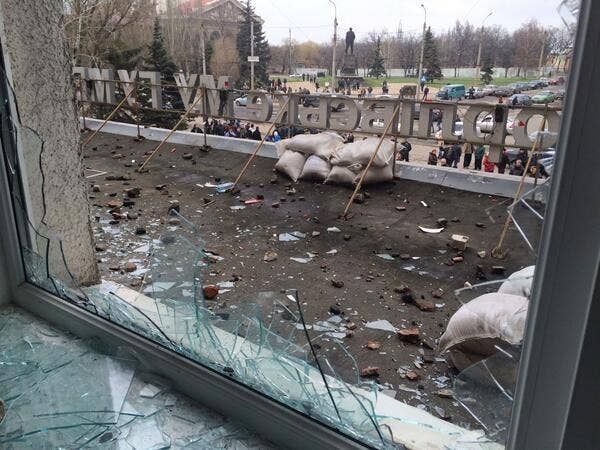
HORLIVKA, Ukraine — At 10:33 Monday morning, Sergei, a freelance cameraman in this sleepy industrial town 30 miles from the eastern Ukrainian city of Donetsk, got a call from a blocked number. The man on the line said he was from Russian state television and asked if he could film an angry mob storming the local police station. Unsure what they were talking about — some anti-government activists had protested in Horlivka over the weekend but police held firm and things were now quiet — Sergei, declined.
Two hours later, he realized what they meant (and had, he assumes, known about in advance). Horlivka's police station was a wreck, with most of its windows smashed in and several hundred working-class men milling around the lobby and courtyard, many of them wielding wooden sticks and iron batons. The police chief, who initially vowed to hold out to the end, was hospitalized after being viciously beaten; his deputy was taken away in handcuffs to the regional government building in Donetsk, which anti-government protesters have occupied for the last week. Two figures in masks waved the black, blue, and red flag of the provincial separatist movement from the roof to loud cheers from the crowd. A man in fatigues wandered out to address them.
"The police in Horlivka have gone over to the side of the people. They were always with us," he said. He claimed the officers inside had removed their Ukrainian insignia and replaced them with orange-and-black ribbons, a World War II symbol reappropriated by pro-Russians during Ukraine's political crisis.
Later, video emerged of the same man claiming he was a Russian lieutenant colonel from Crimea and giving officers orders:
View this video on YouTube
BuzzFeed could not verify the contents of the video, which shows him presenting a Russian passport, not military ID. It would be unusual for a Russian officer to allow himself to be filmed. Phone conversations leaked Monday by Ukraine's security services indicate some of the armed men occupying towns in the east have links to Crimea's government.
The new government in Kiev seems to have all but lost much of eastern Ukraine. By Monday afternoon, the anti-terrorist operation involving the army that acting President Oleksandr Turchynov announced the night before was nowhere to be seen, with anti-government rebels occupying buildings in half a dozen key towns and defying an ultimatum to surrender by morning. Most of the rebels say they want to hold a referendum giving the predominantly Russian-speaking southeastern provinces autonomy under a federative state, though some say they want to leave Ukraine and become part of Russia. Ukraine accuses Russia of fomenting the turmoil ahead of negotiations with the U.S. and European Union in Geneva on Thursday.
Turchynov asked the United Nations to send a peacekeeping force to help restore control of the east, where Ukraine accuses Russia of "exporting terrorism." Russia denies involvement in the disturbances and blames them on Kiev and its western supporters. The men with high-tech weaponry and military training who seized buildings in half a dozen towns over the weekend, however, bear striking resemblances to the "green men" — Russian soldiers without insignia — who seized the Crimean peninsula in early March.
Horlivka was the last major city in Donetsk province holding out against the wave of occupations across the province. By late morning, several hundred anti-government protesters had gathered outside the police station, demanding officers abandon their loyalty to the Kiev government. The police refused. A protesters then climbed on top of the porch and left a Russian flag flying from a fishing pole. Eventually the mob ran at the building and broke their way in past stun grenades thrown by police. Eyewitnesses said most of the officers attempted to resist, but quickly surrendered when they realized they were outnumbered.
Unlike the weekend seizures of police stations in the nearby towns of Slovyansk and Kramatorsk, there was no obvious special forces vanguard leading the charge in Horlivka. A few protesters tried to bring relative order to the crowd, but largely failed in holding back the angry, aggressive mob. Most of the men in the building reacted hostilely to learning there were foreigners present; some of them assaulted British photojournalist Frederick Paxton of Vice News and broke his camera.
Though Ukrainian and Western officials openly fret that Russia may send troops into the east, Kiev's lack of a loyal police force here means the Kremlin may have no need to. Interior Minister Arsen Avakov has effectively admitted losing control over Ukraine's Russian-speaking southeastern promises by announcing the formation of special battalions of "patriots" intended to replace them. Yuri Lutsenko, one of Avakov's predecessors and a leader of the protest movement in Kiev, claims that nearly all police captains in the east are secretly on the payroll of Yanukovych's family.
Whether the east follows Crimea's example in becoming part of Russia is unclear; polls show that most residents support remaining part of Ukraine, while even most of the anti-government protesters deny they want to become a subject of Moscow. Andrei, a local small businessman skulking at the back of the crowd outside the police station, told BuzzFeed that pro-Kiev residents of Horlivka were now scared to speak out in public. "The first thing I do when I talk to business contacts is ask them whether they're for Ukraine or for Russia," he said. "And only after that do we get down to work."

